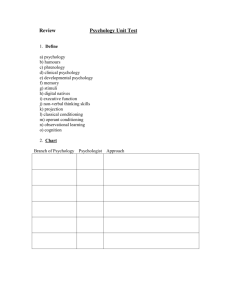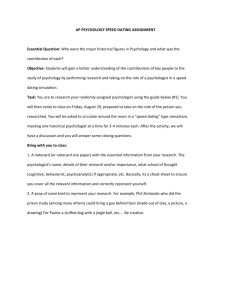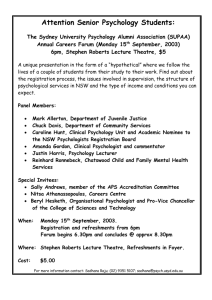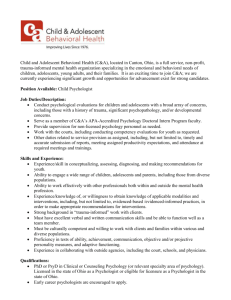History of Psychology In the beginning….
advertisement
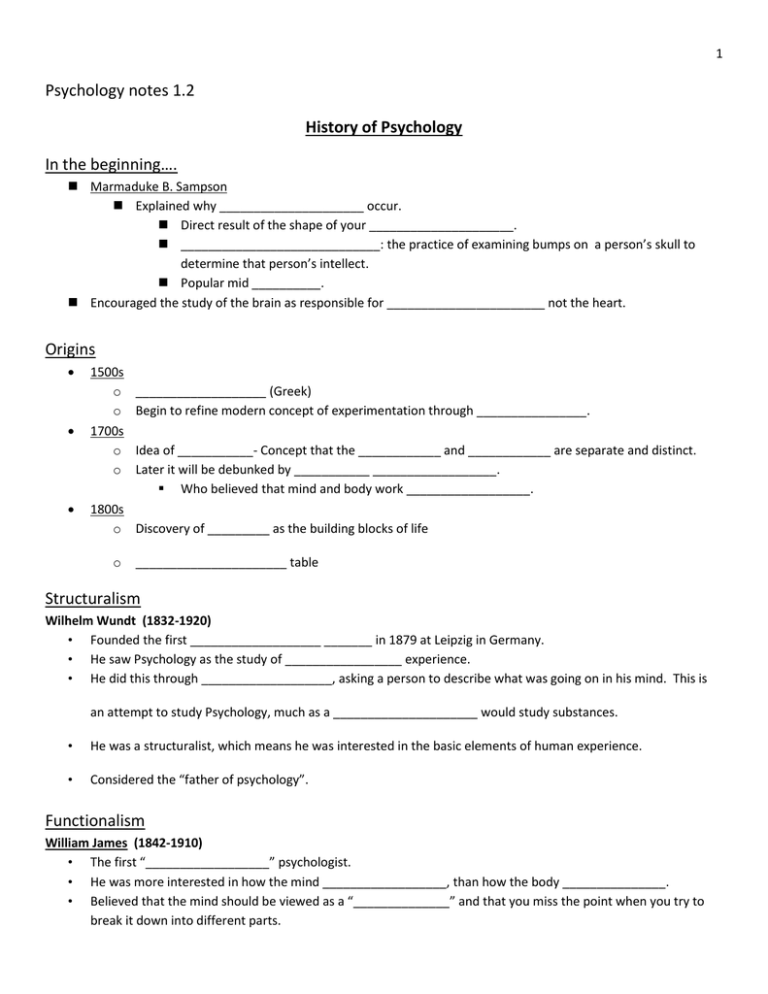
1 Psychology notes 1.2 History of Psychology In the beginning…. Marmaduke B. Sampson Explained why _____________________ occur. Direct result of the shape of your _____________________. _____________________________: the practice of examining bumps on a person’s skull to determine that person’s intellect. Popular mid __________. Encouraged the study of the brain as responsible for _______________________ not the heart. Origins 1500s o o 1700s o o ___________________ (Greek) Begin to refine modern concept of experimentation through ________________. Idea of ___________- Concept that the ____________ and ____________ are separate and distinct. Later it will be debunked by ___________ __________________. Who believed that mind and body work __________________. 1800s o Discovery of _________ as the building blocks of life o ______________________ table Structuralism Wilhelm Wundt (1832-1920) • Founded the first ___________________ _______ in 1879 at Leipzig in Germany. • He saw Psychology as the study of _________________ experience. • He did this through ___________________, asking a person to describe what was going on in his mind. This is an attempt to study Psychology, much as a _____________________ would study substances. • He was a structuralist, which means he was interested in the basic elements of human experience. • Considered the “father of psychology”. Functionalism William James (1842-1910) • The first “__________________” psychologist. • He was more interested in how the mind __________________, than how the body _______________. • Believed that the mind should be viewed as a “______________” and that you miss the point when you try to break it down into different parts. 2 • • He developed “_______________________” as an answer to the problems he encountered with introspection and structuralism. Functionalism: The study of how _________________ and ______________ adapt to their environments. The function, rather than the structure. The first woman to make a career in Psychology Mary Calkins (1863-1930) • Unfortunately, because of _________________ against women in 1895, she never received a PhD. • An ____________________ of William James. • Side note: The first female psychologist with a PhD was __________________ __________________. Inheritable traits Sir Francis Galton Wanted to understand how _______________ influences a persons character/behavior. Belief: genius was __________________ trait, “good” marriages. Didn’t recognize any ___________________________ factors (income and up bringing). Known for creating 1st _________________________________. Gestalt Psychology We see things as a ___________________ not parts. Ex. When people look at a chair, they recognize the chair as a whole rather than noticing its legs, its seat, and its other components. Psychoanalytic Sigmund Freud (1856-1939) • Was a physician who practiced in 1938. • He was more interested in the __________________ mind than the conscious mind. Huh? What the heck does that mean? • He believed Consciousness was only the “tip of the ice burg” and that our _____________________ mind and ___________________ urges are in _________________ with the requirements of society and morality. • According to Freud, these unconscious conflicts are responsible for most ___________________________________________. • Psychoanalyst: A psychologist who studies how unconscious motives and conflicts determine ______________. Behavioral Psychology Ivan Pavlov (1849-1936) Pavlov’s Dog experiment. Pavlov rang a tuning fork each time he gave a dog some meat powder. When the powder reached the dog’s mouth, it would ________________. After Pavlov repeated this procedure several times, the dog would salivate when he heard the tuning fork…Even if there was no food. The dog had been conditioned to associate the _____________ with food. 3 John Watson (1878-1958) • Watson said “You can’t see the ____________ so how can you study it?” • According to Watson, “all we can see is ___________________ behavior and that is what psychology should study. Skinner is also widely known for this view. • Behaviorist: A psychologist who analyzes how organisms learn or ______________ their behavior based on their response to ________________ in the environment. More Options… Humanist: A psychologist who believes that each person has _________________ in directing his or her _____________ and achieving personal growth. Maslow, Rogers and May believed human nature as evolving and self-directed. Cognitivist: A psychologist who studies how we process, store, retrieve, and use information and how cognitive processes ________________ our behavior. Piaget believed behavior is more than a simple response to a stimulus. Psychobiologist: A psychologist who studies how _______________ and chemical ________________ in our bodies ______________ our behavior. “Interview” Task- You and your classmates produce a popular radio program that stages mock “interviews” with famous historical figures. You have been asked to develop a script for an interview with a famous psychologist who represents one of the following major approaches to psychology: structuralism, functionalism, psychoanalysis, behaviorism, humanistic psychology, cognitive psychology, and psychobiology. You will identify questions for the radio talk show host to ask. The questions should be appropriate for the audience who listen to the show. You will then develop answers to the questions that reflect the ideas of the psychologist being interviewed. Target Audience- people who listen to the radio while driving home from work. Time frame- 5 minutes Materials- notes, textbook and your knowledge. Must be school appropriate
